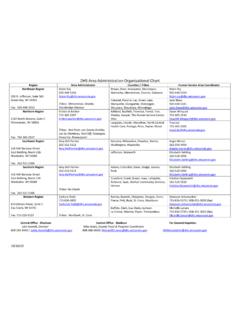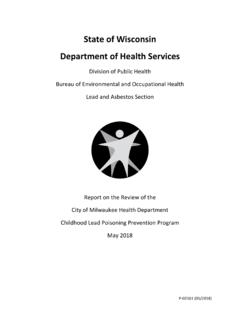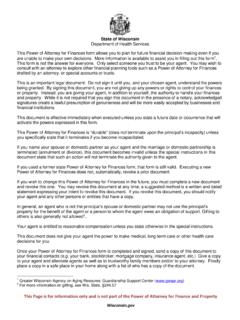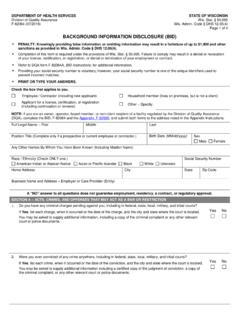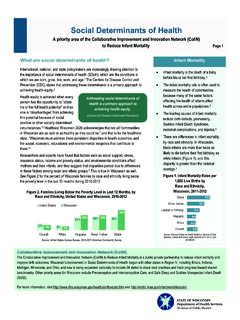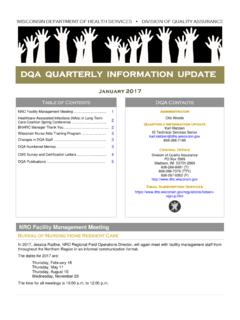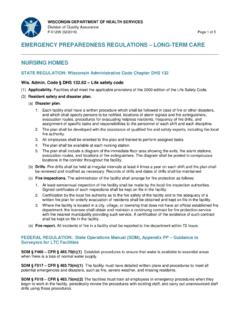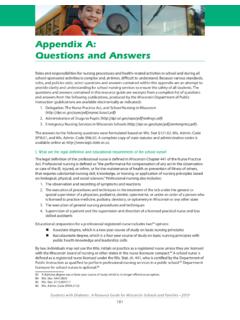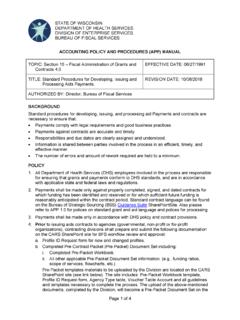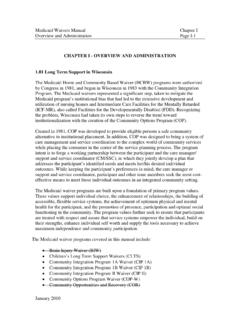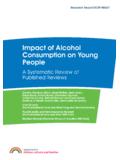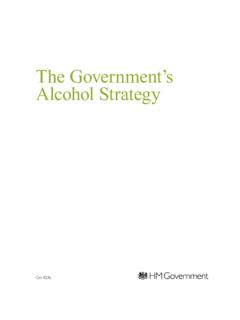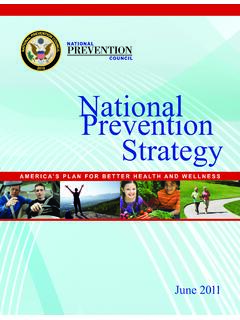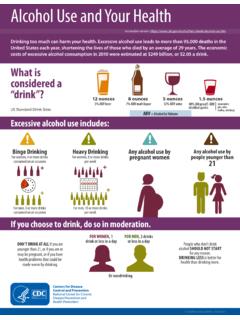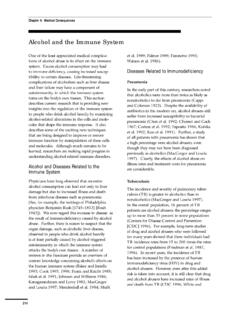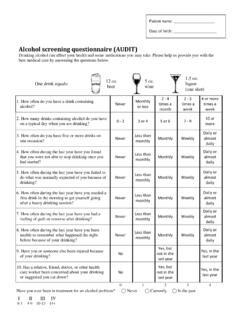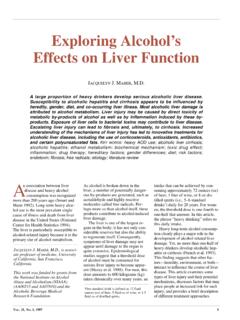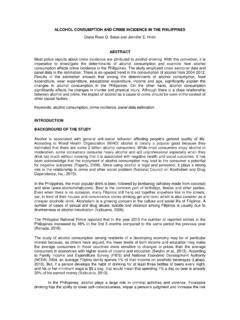Transcription of Moving Forward: Policies and Strategies to Prevent and ...
1 Moving Forward: Policies and Strategies to Prevent and Reduce excessive Alcohol Use in Wisconsin Analysis and Recommendations for Addressing and Reducing excessive Alcohol Use in Wisconsin DECEMBER 2021. Wisconsin State Council on Alcohol and Other Drug Abuse Prevention Committee Alcohol Prevention Ad-Hoc Workgroup State of Wisconsin State Council on Alcohol and Other Drug Abuse 1 West Wilson Street, Box 7851. Madison, Wisconsin 53707-7851. Alcohol Prevention Ad-Hoc Workgroup Recommendations 2021. Table of Contents Table of Contents .. 1. Charge to the Alcohol Prevention Ad-Hoc Workgroup .. 2. Alcohol Prevention Ad-Hoc Workgroup Membership .. 3. Background .. 4. Using This Report .. 6. Executive Summary .. 7. Local Government ..10. State Government and State Agencies ..22. Civic, Community, Educational, and Religious 35. Healthcare Alcohol Conclusion ..42. Appendices ..43. Appendix A: Summary of Recommendations ..43. Appendix B: Wausau's Sober Server Ordinance.
2 47. Glossary of Terms ..48. References ..55. Recommended Citation: Alcohol Prevention Ad Hoc Workgroup, State Council on Alcohol and Other Drug Abuse. (2021). Moving Forward: Policies and Strategies to Prevent and Reduce excessive Alcohol Use in Wisconsin. State of Wisconsin. Wisconsin State Council on Alcohol and Other Drug Abuse | 1 West Wilson Street, Box 7851 | Madison, Wisconsin 53707-7851. 1. Alcohol Prevention Ad-Hoc Workgroup Recommendations 2021. Charge to the Alcohol Prevention Ad-Hoc Workgroup excessive alcohol use remains a significant threat to the health, safety, and prosperity of Wisconsin's residents. Despite decreases in underage drinking, Wisconsin's rate of underage drinking remains above the national average. Early alcohol use creates a vulnerability to later opiate misuse and dependence among our children, a risk that should trouble all residents. Unhealthy and dangerous drinking among Wisconsin's adult population remains disturbingly high.
3 Recent research suggests that even moderate alcohol use among the elderly carries more health and safety consequences than previously known. Given the broad scope of alcohol-related concerns in Wisconsin, this is a public health and safety concern that must be addressed at the population level. There is a need for effective individual and population level interventions that can be implemented throughout Wisconsin. Since the 2010 release of the State Council on Alcohol and Other Drug Abuse's (SCAODA) report on Alcohol, Culture and Environment, municipal interest and experience in implementing evidence-informed Policies and practices that reduce alcohol misuse has increased dramatically. In the intervening decade, research into effective Policies and practices has refined earlier options and suggested new interventions and Policies . In addition, the increasing range of retailing options and alcohol products creates issues unanticipated by current statutes.
4 Across Wisconsin, communities are working to meet the three alcohol-related objectives in Healthy Wisconsin; 1) reducing underage drinking, 2) reducing heavy and binge drinking among adults and, 3) reducing alcohol-related deaths. These three goals will improve the quality of life in Wisconsin and can reduce the financial burden excessive alcohol consumption places on municipalities responsible for emergency services and law enforcement. Accordingly, the Alcohol Prevention Ad Hoc Committee will review and recommend evidence-based and evidence-informed alcohol Policies that support the objectives and Strategies listed in Healthy Wisconsin and can be effectively implemented under Wisconsin's alcohol policy framework. The Ad Hoc Committee will: Identify barriers that slow progress towards the alcohol objectives in Healthy Wisconsin. Identify gaps in Chapter 125 statutory language that limit or Prevent effective alcohol regulation.
5 Identify the groups, organizations and professions that have roles in the adoption and implementation of identified Strategies . Identify under-recognized alcohol-related health issues and the appropriate agency, organization, or profession best able to fill those gaps. Identify gaps in data collection that limit the ability of law enforcement, health care providers and educators to identify and implement effective policy or program options. Consider how all levels of government can support individuals in addiction recovery in their communities. Wisconsin State Council on Alcohol and Other Drug Abuse | 1 West Wilson Street, Box 7851 | Madison, Wisconsin 53707-7851. 2. Alcohol Prevention Ad-Hoc Workgroup Recommendations 2021. Alcohol Prevention Ad-Hoc Workgroup Membership Dawn Berney, MPA Dan Nordstrom Executive Director, Jewish Social Services Citizen Member Vaughn Bowles, MHA, MBA Very Reverend David H. Reith Public Information Officer, Menominee Tribal Vicar General, Catholic Charities of the Archdiocese Clinic of Milwaukee Maureen Busalacchi (Committee Chair) Julia Sherman Director, Wisconsin Alcohol Policy Project, Founding Director of the Wisconsin Alcohol Policy Comprehensive Injury Center, Medical College of Project (Retired).
6 Wisconsin Chief Aaron Chapin Ex-Officio Members Chief of Police, Village of McFarland Felice Borisy-Rudin, JD, PhD. Lynne Cotter, MPH, PhD Candidate Policy Analyst, Wisconsin Alcohol Policy Project Research Scientist at the Wisconsin Department of Health Services (Former) Reverend Brian Mason Former Pastor of the St. Mary Parish, Hales Cecilia Culp, MS Corners Health Equity Program and Policy Analyst, Wisconsin Department of Health Services Margarita Northrop, MPH, MIPA. Wisconsin Department of Health Services Anne DeGarmo Legislative Advisor, Wisconsin Department of Committee Staff Revenue Elizabeth Adams, MPH. Jenny Hallett Prevention Outreach Specialist, Wisconsin Impacted Citizen Member Department of Health Services David Houghton Morgan Bloch Citizen Member Research Assistant, Wisconsin Alcohol Policy Project Sarah Johnson Community Health Education Specialist, Public Mary Raina Haralampopoulos, MSW. Health Madison & Dane County Prevention Coordinator, Wisconsin Department of Health Services Hee Soo Jung, MD.
7 Associate Professor of Surgery, Department of Surgery, University of Wisconsin School of *Workgroup members and staff listed were contributors Medicine and Public Health to this report. Individual recommendations in this report are not necessarily endorsed by the committee members, Sara Kohlbeck, MPH staff, or their employers. Director, Division of Suicide Prevention Comprehensive Injury Center PhD Candidate, Institute for Health and Equity Medical College of Wisconsin LaShawnda Maulson Prevention Program Director, Lac du Flambeau Tribe Wisconsin State Council on Alcohol and Other Drug Abuse | 1 West Wilson Street, Box 7851 | Madison, Wisconsin 53707-7851. 3. Alcohol Prevention Ad-Hoc Workgroup Recommendations 2021. Background The State Council on Alcohol and Other Drug Abuse's 2010 report on Alcohol, Culture, and Environment created statewide interest and action towards reducing excessive alcohol use in Wisconsin through evidence-based and evidence-informed practices.
8 Since 2010, Wisconsin has seen improvements in youth drinking behaviors that are comparable to the national trends. Between 2011 and 2019, the number of Wisconsin youth who had ever consumed alcohol decreased. In addition, the number of Wisconsin youth who consumed alcohol in the past month prior to answering the survey decreased by 24%. Wisconsin has also seen improvements in adult awareness about binge drinking; between 2013 and 2018, awareness of great risk of harm from weekly binge drinking increased 11%. Yet, this remains lower than the national average and behaviors of alcohol use and binge drinking by Wisconsin adults did not change significantly during 2013-2018. Alcohol-attributable deaths in Wisconsin have also increased 30% over the same period of time, and increased another 18% in 2020 during the Covid-19 pandemic. (Wisconsin Department of Health Services [WI DHS], 2019). Healthiest Wisconsin 2020, the community-driven Wisconsin State Health Plan, designated alcohol as one of the five priority health issues that Wisconsin communities need to continue to address due to high rates of use (WI DHS, 2019).
9 The use of alcohol by Wisconsin adults and youth (ages 12- 18) consistently remains higher than the national average. According to WI DHS' data dashboards, in 2019: of adults in Wisconsin indicate they used alcohol in the past month compared to of adults in the United States (US). of adults in Wisconsin indicate binge drinking in the past month compared to of adults in the US. of youth in Wisconsin indicate they have ever consumed alcohol compared to of youth in the US. of youth in Wisconsin indicate they have used alcohol in the past month compared to of youth in the US. That means that over approximately 150,000 high school students in Wisconsin had used alcohol in the past month. Figure 1. Adult and Youth Alcohol Use in Wisconsin and the United States, 2019. Adult Alcohol Use Youth Alcohol Use 100%. Wisconsin US 100%. Wisconsin US. 80%. 80%. 60% 60%. 40% 40% 20% 20%. 0% 0%. Alcohol use in past Binge drinking in past Alcohol use in past Ever consumed alcohol month month month Source: WI DHS Alcohol Adult Consumption Module and WI DHS Alcohol Youth Consumption Module.
10 Available at Accessed on 9/15/2021. Wisconsin State Council on Alcohol and Other Drug Abuse | 1 West Wilson Street, Box 7851 | Madison, Wisconsin 53707-7851. 4. Alcohol Prevention Ad-Hoc Workgroup Recommendations 2021. The high prevalence of unhealthy drinking behaviors negatively impacts individual disease and death. The most recent data in Wisconsin show that: Estimated deaths attributed to alcohol have increased each year since 2014. Most recently in 2020, there were an estimated 3,099 deaths attributed to alcohol (WI DHS). There were 36,925 emergency room visits in 2019 due to chronic alcohol use conditions (WI DHS). Alcohol is the most commonly found substance among suicide deaths between 2014-2017. ( Prevent Suicide Wisconsin, 2020). Alcohol was the most common substance for individuals seeking substance use services in 2020. About 12,095 ( ) of individuals were served for alcohol related services (WI. DHS). Drinking alcohol can increase a person's risk for at least seven types of cancer and Wisconsin is above the national average of cases for three of them, including mouth and throat, larynx, and esophagus cancer (American Cancer Society, 2016).
